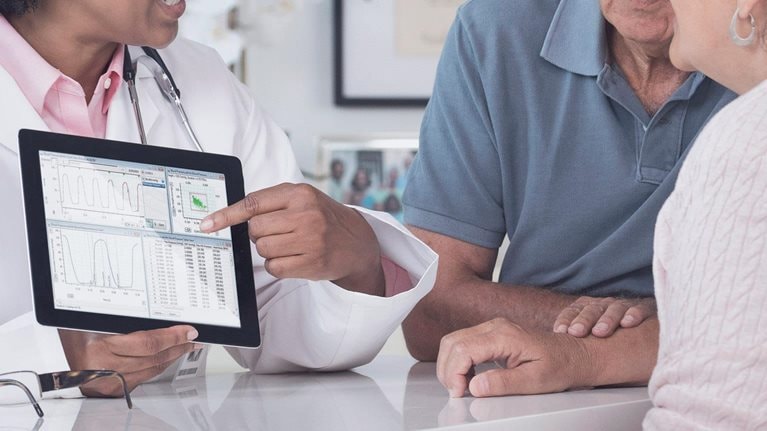Non-interventional or observational research is playing an increasingly important role in our understanding of the clinical and economic costs of disease and the benefits and risks of therapeutic interventions. Brian Bradbury, vice president and head of the Center for Observational Research (CfOR), spoke with McKinsey’s Anna Draganova Beloff and Lucy Pérez about how the center is building capabilities to take advantage of shifts in the data environment to advance healthcare delivery and patient outcomes. An edited excerpt of their conversation follows.
McKinsey: What first prompted Amgen to invest in data and analytics?
Brian Bradbury: When I joined in 2004, we were a group of five epidemiologists working in the biostatistics organization, and at that time, drug development focused on executing randomized clinical trials to support registration. Few of our colleagues knew much about epidemiology, so it was up to us to figure out how we could add value to the organization.
Early on we were faced with a potential safety issue involving epoetin alfa, Amgen’s flagship medicine for treating chronic anemia in patients receiving dialysis for renal failure. A couple of observational studies had showed that patients on the highest doses of the drug had an almost threefold higher risk of death than patients on the lowest doses.
Amgen set up a research program that involved our in-house group working alongside four leading academic institutions. This multistakeholder collaboration resulted in ten published peer-reviewed papers, all of which showed that the original findings of elevated risk were attributable to residual confounding, which for epoetin alfa were due to the strong link between dose escalation and disease progression. This research effort not only provided evidence regarding the safety of one of our medicines but also demonstrated that our group was committed to conducting and publishing high-quality science. It also showed that the use of large healthcare data in safety evaluation was an important capability to develop.
McKinsey: How does your work align with Amgen’s mission?
Brian Bradbury: We have a strong connection to Amgen’s mission, which is to serve patients by developing innovative medicines that treat life-interrupting illnesses. That aligns well with the public-health orientation of our group, which consists of epidemiologists, economists, data scientists, and statistical and database programmers. We believe our training in the design and analysis of real-world data [RWD] enables us to make a significant contribution to the patients we serve.
McKinsey: How has your group changed over the years?
Brian Bradbury: In the early days, we focused on incidence, prevalence, disease burden, and a little safety work. As awareness grew that RWD can be used to address questions across the drug-development life cycle, our remit gradually expanded. Today, our colleagues are keen to use RWD to help accelerate clinical programs, to develop real-world comparator populations, and evaluate comparative effectiveness. In addition, we now do a lot of safety-related work—using data to answer questions from regulators—and in some situations, execute postmarketing commitments in-house. For example, if you can use healthcare-system data to reliably and rapidly answer a safety question rather than needing to conduct an expensive randomized experiment that could take years to read out, those savings can be reinvested in the development of innovative new medicines. This helps to reinforce the value of this type of approach.
As Amgen extended its focus beyond the US and Western Europe, we established collaborations with academic investigators in multiple countries. Building strong, trusted relationships with our collaborators takes time, effort, and commitment, but it strengthens our ability to deliver high-quality evidence to stakeholders across the globe. To achieve a cultural shift like this, you need enlightened leaders who see and support the vision.
McKinsey: How do you integrate your work across functions?
Brian Bradbury: At many companies, the epidemiology or RWE function sits in either the safety or the HEOR [health economics and outcomes research] organizations. At Amgen, however, we’ve always sat within development and have built strong, collaborative working relationships with colleagues in key areas such as safety, medical, value, and access.
The structure of CfOR follows a hybrid model. Our product-oriented team works closely with Amgen’s product teams to deliver the RWE needed to shepherd each medicine through drug development. Then we have function-oriented groups to develop specific capabilities—such as descriptive epidemiology, and causal-inference analytics—that Amgen’s product-facing scientists draw on to execute projects. It’s a highly efficient model that also broadens career-development options for our staff, providing different types of roles to work in, new challenges and opportunities, and the chance to become more versatile professional scientists.
McKinsey: When you think about building an organization that’s sustainable for the future, what do you see as the key elements?
Brian Bradbury: First you need to hire staff who are well trained, committed to your mission, and eager to make a difference while also providing them opportunities for career growth. You also need a strong data and analytics “ecosystem” that can enable your scientists to deliver high-quality RWE to support internal and external decision making.
Another fundamental dimension is using the best design and analytical methods and committing to publish what we find. Over a decade ago, we established a methodology committee to conduct a rigorous technical review of all non-interventional research projects before they begin. We also set up a council of external experts in epidemiological and statistical methods that meets with our staff once a year, provides feedback on their work, and keeps them informed about the latest developments. We hope to bring recognition to the quality and credibility of our work and contribute meaningfully to healthcare conversations and decisions. This is important for attracting the best talent.
McKinsey: How do you personally view the shift to RWE?
Brian Bradbury: For an epidemiologist, it’s exciting to be part of the growing acceptance of RWE, especially with the passing of the 21st Century Cures Act and the PDUFA VI [Prescription Drug User Fee Act] legislation in the US, and the prospect that fit-for-purpose RWE could be used to support regulatory decisions under certain conditions. Greater opportunities bring greater responsibility, so as a community, we need to push for the highest standards in data quality, scientific methods, and transparency. Research needs a principled approach, and it takes time. Going too quickly can cause errors and misjudgments.
RWE approaches need to be chosen wisely, with the knowledge they are not appropriate or likely to succeed in every case, so doing feasibility assessments up front are key to determining when to use an RWE study. If we commit to the long game and put in the time and work needed to gain broader acceptance, we’ll have an opportunity to help shape drug development, reduce healthcare costs, and bring innovative therapies more quickly to patients in need.
McKinsey: Have you had any early successes from this approach? And what do you see as the next frontier for RWE?
Brian Bradbury: Yes, a good example is how we used a real-world external comparator arm to support the accelerated approval of Blincyto, Amgen’s medicine used to treat B-cell precursor acute lymphoblastic leukemia. The complete remission data observed in this external comparator arm population was used to contextualize the results of the single-arm phase 2 study with Blincyto. Importantly, the findings were consistent with the results of the phase 3 randomized study comparing Blincyto to standard-of-care chemotherapy that was released a few years later.
Looking ahead, one dimension that’s starting to take shape is the idea of executing clinical studies within healthcare systems. That can help to bridge evidence obtained from randomized trials with that derived from patients in clinical practice. The strengths of clinical experiments, such as randomization, highly protocolized delivery of care, exquisite data collection, and homogeneous populations, are often adduced as arguments for why results aren’t applicable in a clinical-practice setting. Generating RWE to help contextualize clinical-trial results could potentially help accelerate payers’ and providers’ acceptance of new medicines.
McKinsey: Levels of data access vary enormously across the world. What role can pharmaceutical companies play in accelerating that access?
Brian Bradbury: As public debate about data privacy intensifies, the volume and richness of healthcare data continue to grow. Although there are many databases that can be licensed, such as CPRD [Clinical Practice Research Datalink] in the UK and Flatiron in the US, many countries have data restrictions that limit or prevent direct access. Collaborative research with investigators is one model for enabling RWE in these circumstances. But as technology advances, we may no longer need to bring data into our own environment; instead, we could use cloud-based technologies to take analysis to the data.
Think about what the FDA has done with the Sentinel System: building a distributed network using a federated data access that allows robust analytics to be executed against data in remote locations. Patient data is protected because it never leaves its native environments. A similar model could work in other jurisdictions. Using evidence to inform decision making doesn’t mean you have to hold all the data yourself. One could imagine that the big data players are contemplating approaches that disrupt the current data-model building toward a more localized model that varies by jurisdiction.
McKinsey: You’ve talked about collaborating with academics. What other kinds of collaboration are important?
Brian Bradbury: It is now often said that data is the new oil, so we need to forge relationships with data providers to create enriched data ecosystems that can foster evidence generation. We’re also forming partnerships with advanced-analytic groups to build an analytic infrastructure to help us answer questions in the best and most robust way. In terms of technology, the cloud has changed everything. You can have docking stations and connect remotely to data wherever it resides. Pulling these things together could create an ecosystem we all benefit from.
In terms of technology, the cloud has changed everything. You can have docking stations and connect remotely to data wherever it resides.
McKinsey: What are the priorities for your group in the next five years?
Brian Bradbury: An important part of it is to keep demonstrating the value of high-quality RWE. To do that, we have to make sure that we hold ourselves to the highest standards of our profession. As an example, every study we do internally has double quality control, which is rare even among academic institutions. We seek to be a learning organization, and our hope is that our work will contribute meaningfully to the broader public-health agenda.
We know there’s still a lot of work to do in helping patients improve their health outcomes, including getting medicines to patients much faster. Often during staff meetings, we have the privilege to hear from a patient who has been treated with one of Amgen’s medicines. I recall a young father tell his story of being diagnosed with acute lymphoblastic leukemia and that the tumor coverage in his cells was greater than 50 percent, which meant he had a very poor prognosis. He had been treated with Blincyto, and it had a remarkable impact on his life. He ultimately was able to get a stem cell transplant, has now recovered, and will be able to see his kids grow up. Everyone in that meeting teared up. Seeing the impact our research can have on improving lives is what it is all about and what motivates our staff.
McKinsey: How has COVID-19 changed the way your group operates, and what do you see as the broader impact of the pandemic on real-world evidence generation?
Brian Bradbury: We all see and feel the intense impact that COVID-19 is having on our society, families and friends, healthcare workers, and local businesses—all aspects of our lives. It most certainly has intensified the need for credible, data-driven insights to help inform decision making. Governments, health authorities, biopharmaceutical companies, insurers, and just about everyone in the healthcare ecosystem are looking to real-world data to help them understand what is happening and how they can best respond. For our group, we are working tirelessly to address the critical questions from our leaders and teams, support Amgen’s efforts to develop medicines to combat the virus, and also better understand the collateral effects COVID-19 is having on patients with various diseases, including cardiovascular disease, cancer, and osteoporosis.
We see and hear that our frontline healthcare workers are searching for solutions to help patients hospitalized with COVID-19. And clinical trials are underway testing the efficacy and safety of both repurposed and newly developed medicines and vaccines. But until there are results from those trials, rapidly accumulating RWE—coupled with principled, high-quality non-interventional studies—can potentially help us better understand the natural history of this disease and the safety of treatments that are currently being administered to patients with COVID-19.
Comments and opinions expressed by interviewees are their own and do not represent or reflect opinion, policy, position, or endorsement of/by McKinsey & Company.


